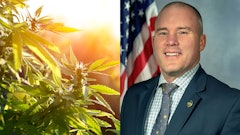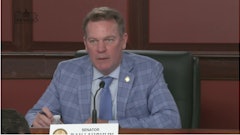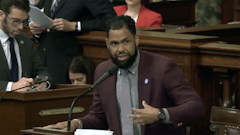
Virginia made history last year when it became the first state in the South to fully legalize cannabis, but a new governor and a reenactment clause in the law could bring changes to the original statute that the General Assembly approved in April.
“Virginia’s legalization law … was somewhat unique,” Karen O’Keefe, director of state policies for Marijuana Policy Project (MPP), told Cannabis Business Times. “Virginia can pass laws that require reauthorization, meaning they don’t take effect unless the Legislature votes for them again.”
Outgoing Gov. Ralph Northam signed the state’s adult-use legislation into law last spring, after the General Assembly approved amendments to expedite the cannabis possession and home grow provisions, which took effect July 1.
Under the current law, adults 21 and older can legally possess up to 1 ounce of cannabis in public and can cultivate up to four plants at their primary residence for personal use.
Commercial sales are slated to start Jan. 1, 2024, under the statute, but until then, selling or purchasing cannabis outside Virginia’s medical program remains illegal.
“We hear every day from Virginians frustrated that even though cannabis is legal for adults 21 [and older], they cannot shop at the already operational medical dispensaries unless they are registered patients,” said NORML Development Director JM Pedini, who also serves as the executive director of the Virginia chapter. “In addition to expediting sales through existing operators, it is imperative that the commonwealth speed up the licensing of new cannabusinesses. Delaying such only emboldens illicit-market activity, whereas a regulated marketplace can best provide for consumer and public safety.”
While the July 1, 2021, effective date for legal possession and home grow cannot be altered by the General Assembly, O’Keefe said almost all the regulatory details about legalizing and regulating commercial sales, issuing business licenses, and taxation require reauthorization and will only take effect when—and if—the General Assembly reenacts them or enacts a changed version of them during this year’s legislative session, which kicks off Jan. 12.
“Virginia’s also somewhat unusual in that governors don’t outright veto or sign a bill sometimes,” O’Keefe said. “They can do both of those things, but they can also formally request changes to legislation that is presented to them, which essentially means the Legislature can either sign off on the changes or the governor vetoes it, … and then they have to override the veto.”
Since Virginia’s adult-use cannabis law is not yet fully enacted, O’Keefe said Republican Gov.-elect Glenn Youngkin, who officially takes office Jan. 15, “has a lot of power on the details” of how the program will ultimately be implemented.
“Though cannabis was not a campaign issue for Gov.-elect Youngkin, he has since made clear his priority is to ensure Virginia’s regulated market is competitive and thriving,” Pedini said. “The specifics of what that might look like must ultimately be agreed upon by the Democrat-controlled Senate and the Republican-led House of Delegates. If the chambers are able to reach a consensus and send a bill to the governor’s desk, it would be at that time he might offer specific amendments.”
What those specific amendments might be is less clear, however.
During a Dec. 31 interview with Virginia Business, Youngkin said that he “will not seek to overturn the law on personal possession,” but did not rule out tweaks to other aspects of the law that are subject to reenactment.
“When it comes to commercialization, I think there is a lot of work to be done,” he told the news outlet.
“I’m not against it, but there’s a lot of work to be done. There are some nonstarters, including the forced unionization that’s in the current bill. There have been concerns expressed by law enforcement in how the gap in the laws can actually be enforced.”
Regarding the bill’s social equity provisions, Youngkin told Virginia Business that “there’s a real need to make sure that we aren’t promoting an anti-competitive industry. I do understand that there are preferences to make sure that all participants in the industry are qualified to do the industry well.”
Youngkin added that he is “all for opportunities for minority-owned businesses, women-owned businesses [and] military-owned businesses. We also have to make sure that they have the capabilities to compete and thrive in the industry.”
While it remains to be seen what, if any, changes Youngkin formally requests on the legislation, O’Keefe is optimistic that his comments on minority- and women-owned businesses mean he wants to support these entrepreneurs through technical assistance and funding.
“I would hope that it would mean he wants to support these businesses and help them thrive, but it might mean that he wants to have high capital requirements or something like that that makes it harder for smaller operators to get involved,” she said. “What this means in practice, it’s hard to know for sure. We certainly know he wants to get rid of the labor provisions and wants to make some changes related to who’s licensed and how.”
Many of the bill’s social equity provisions do not require reenactment, O’Keefe added, including language that sets aside money for a Cannabis Equity Loan Fund and the law’s definition of social equity applicants, which are businesses majority owned by those with prior cannabis-related convictions, those who reside in areas disproportionately impacted by prohibition and alumni of one of Virginia’s Historically Black Colleges and Universities (HBCUs).
“However, since the heart of the bill does require reenactment—a lot of the licensing and the tax does—it could very well be that even though these technically are in the law, it’s a whole package that’s going to be negotiated in the Senate, which has Democratic control, the House, which has Republican control, and the governor,” O’Keefe said.
Virginia’s legislative session runs through March 12, but if the governor requests changes on the adult-use cannabis legislation after the General Assembly goes through the reenactment process, the law may not be finalized until later in the spring, O’Keefe said.
“The bottom line is possession and cultivation by adults is already legal,” she said. “The governor has said he won’t seek to overturn the law on personal possession. I doubt he could do so if he wanted to because it’s already law and the Democrat-controlled Senate is still in power, and I don’t think they’d reverse themselves because he wanted them to. But the details of how the regulated system will operate are still very much in question and haven’t been signed off on. Any of that could change."
























